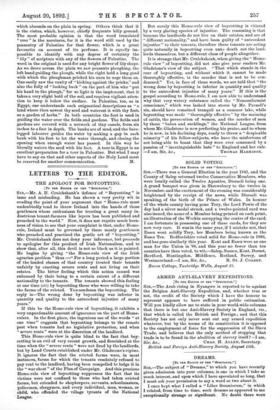LETTERS TO THE EDITOR.
THE APOLOGY FOR BOYCOTTING.
[To TER Enrros or rag "SrEcrArorg.1 Stn,—Mr. A. H. Cruickshank's defence of " Boycotting " is lame and misleading. He has shown a very pretty wit in evading the point of your argument that "Home-rule must undoubtedly tend to throw Ireland into the hands of those gentlemen whose enthusiasm for treating a great many in- dustrious tenant-farmers like lepers has been published and preached to the world." Now, it does not require much keen- ness of vision to see that your complaint is that, under Home- rule, Ireland must be governed by those manly gentlemen who preached and practised the gentle art of "boycotting." Mr. Cruickshank does not deny your inference, but proceeds to apologise for this product of Irish Nationalism, and to show that, after all, this devil is not so black as it is painted. He begins by giving "the Home-rule view of the Irish agrarian problem" thus :—" For a long period a large portion of the landed classes of that country treated their tenants unfairly by exacting severe rents and not living on their estates. The bitter feeling which this action caused was enhanced by their being to a certain extent of a different nationality to the tenants. The tenants showed this feeling at one time (sic) by boycotting those who were willing to take the farms of the evicted. You condemn the boycotting. The reply is--The wrong done by boycotting was inferior in quantity and quality to the antecedent injustice of many years."
If this be the Home-rule view of boycotting, it exhibits a very unpardonable amount of ignorance on the part of Home- rulers. In the first place, the ingenious use of the words "at one time" suggests that boycotting belongs to the remote past when tenants had no legislative protection, and when "severe rents" were at the discretion of the landlord.
This Home-rule view is quite blind to the fact that boy- cotting is an evil of very recent growth, and flourished at the time when the "severe rents" were not fixed by the landlords, but by Land Courts established under Mr. Gladstone's regime. It ignores the fact that the evicted farms were, in most instances, farms for which the tenants resolutely refused to pay rent to the landlord, having been compelled to lodge it in the "war chest" of the Plan of Campaign. And this precious Home-rule view of boycotting suppresses the fact that its victims were not confined to those who had taken evicted farms, but extended to shopkeepers, servants, schoolmasters, Policemen, clergymen, and every individual, man, woman, or child, who offended the village tyrants of the National League. But surely this Home-rule view of boycotting is vitiated by a very glaring species of injustice. The reasoning is that because the landlords do not live on their estates, and are of "different nationality," and have been guilty of "antecedent injustice" to their tenants, therefore these tenants are acting quite naturally in boycotting even unto death not the land- lords themselves, but a different class of people altogether.
It is strange that Mr. Cruickshank, when giving the" Home- rule view" of boycotting, did not also give your readers Mr. Gladstone's view of the subject. "That which stands in the rear of boycotting, and without which it cannot be made thoroughly effective, is the murder that is not to be con- demned." Yet, in face of these words, we are told that "the wrong done by boycotting is inferior in quantity and quality to the antecedent injustice of many years." If this is the gospel according to Home-rule, I am now able to understand why that very watery substance called the "Nonconformist conscience," which was lashed into storm by Mr. Parnell's sin, should have remained tranquil as a. summer lake, while boycotting was made "thoroughly effective" by the maiming of cattle, the persecution of women, and the murder of men by those "babes and sucklings," the National League, from whom Mr. Gladstone is now perfecting his praise, and to whom he is now, in his declining days, ready to throw a "despicable minority" of his fellow-subjects, who have the misfortune of not being able to boast that they were ever consumed by a passion of "inextinguishable hate" to England and her rule.


































 Previous page
Previous page